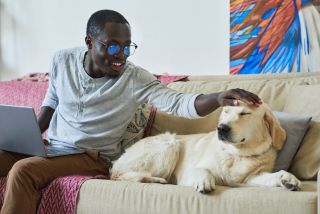Relationships
The Healing Power of Animal-Human Relationships
Interspecies bonds foster emotional resilience and well-being.
Posted May 23, 2024 Reviewed by Jessica Schrader
Key points
- Relationships with animals can support individuals with PTSD through strengthened affiliative connections.
- Animals can help trauma survivors reconnect with compassion by acting as mirrors for love and care.
- Animal-assisted methods offer non-pharmaceutical therapeutic options for various mental health issues.

Our relationships with other beings have the potential to be profoundly healing. Deep experiences of love, care, and co-regulation occur both among humans and between humans and various animal species. Dogs, cats, birds, horses, cows, elephants, dolphins, and many other animals can experience these interspecies connections.
Research shows that dogs and horses, in particular, can facilitate bidirectional healing when a caring relationship is present. Family dogs synchronize their behavior with both adults and children in the family, strengthening affiliative connections (Wanser et al., 2021). Both dogs and horses can work effectively with individuals with PTSD and those with disrupted attachment capacities (Fisher et al., 2021). Some programs involve humans with PTSD helping animals with PTSD, which highlights the power of mutually healing relationships (Schlote, 2018).
Animals as Catalysts for Compassion
Many people who have experienced trauma have difficulty feeling compassion for themselves. Animals offer a mirror for love and can catalyze compassion. When hurt by humans, connecting with another species provides an opportunity to tune in to and express the love that persists despite the hurt. Caring for animals and advocating for their welfare can help shift focus from personal problems to finding purpose and meaning in life.
Intuition and Synchronization
In addition to verbal and nonverbal communication, we use intuition, tuning in with nonverbal cues. Profound connections with other beings synchronize our rhythms: our brain waves align, we breathe in unison, and we share emotional alignment. This heightened cognitive flexibility fosters deeper connection, empathy, and attachment.
Animals are naturally intuitive, often tuning in to our needs and responding subtly (Birke & Thompson, 2019). Dogs, in particular, are easily trained to respond to our needs, acting as guardians, guides, and healers. Celtic mythology even believed dogs could heal by their presence. Modern science confirms that dogs help us in many ways: getting us out of bed for a walk, socializing at dog parks, and providing nonjudgmental love and care.

Emotional Assistance Animals
Dogs can be trained to aid in daily activities, detect elevated blood sugar or cancer, and warn of dysautonomia effects. For those experiencing traumatic stress and sleep disturbances, trained service dogs can help by recognizing and responding to nightmares, night terrors, sleepwalking, or obstructive sleep apnea (Scotland-Coogan, 2019).
Animals offer a non-pharmaceutical option for self-regulation, attachment, dissociation, phobias, and even suicidality. Much mental distress occurs in isolation and disconnection, making it essential to help clients build relationships with both humans and animals.
Especially for clients who are depressed, immobilized, or in pain, having an animal to care for can be beneficial. Subtle biological and physiological exchanges with animals help regulate the nervous system. Enhancing clients’ social connections and relationships with animals increases the love hormone (oxytocin) and provides numerous other benefits.
Oxytocin is called “the love hormone” because it is released in response to birthing and lactation. It stimulates contractions, aids in mother-child bonding, and drives a neurohormone response to attachment behaviors. Petting animals, hugging, cuddling, rocking someone, having sex, and consuming vitamins C and D or dietary fats are all precursors to oxytocin.
Other Ways to Create a Bond With Animals
There are many ways to introduce and support the human-animal bond in therapy or at home that don’t require having a pet or an emotional support animal:
- Volunteer at a shelter or rescue.
- Offer to pet-sit or dog-walk for others.
- Spend time with a friend’s, relative’s, or neighbor’s animal companion.
- Visit a cat café (a combination café and cat rescue).
- Join animal yoga sessions (e.g., goat yoga) or cow hugging.
- Visit a bird sanctuary (a safe place for wild birds to recover from injuries).
- Engage in animal activism.
- View photos or videos of young mammals (e.g., puppies, kittens) to evoke compassion for both the animals and oneself.
References
Wanser, S. H., MacDonald, M., & Udell, M. A. R. (2021). Dog–human behavioral synchronization: Family dogs synchronize their behavior with child family members. Animal Cognition, 24, 747–752. https://doi.org/10.1007/s10071-020-01454-4
Fisher, P. W., Lazarov, A., Lowell, A., Arnon, S., Turner, J. B., Bergman, M., Ryba, M., Such, S., Marohasy, C., Zhu, X., Suarez-Jimenez, B., Markowitz, J. C., & Neria, Y. (2021). Equine-assisted therapy for posttraumatic stress disorder among military veterans: An open trial. Journal of Clinical Psychiatry, 82(5). https://doi.org/10.4088/JCP.21m14005
Schlote, S. (2018). Integrating somatic experiencing and attachment theory into equine-facilitated trauma recovery. In. K. Trotter and J. Baggerly (Eds.), Equine-assisted mental health for healing trauma (pp. 3–18). Routledge.
Birke, L., & and Thompson, K. (2019). (Un)stable relations: Horses, humans and social agency. Routledge.
Scotland-Coogan, D. (2019). Anxiety symptoms and sleep disturbance in veterans with posttraumatic stress disorder: The impact of receiving and training a service dog. TQR, 24(10), 2655–2674. https://doi.org/10.46743/2160-3715/2019.3573


